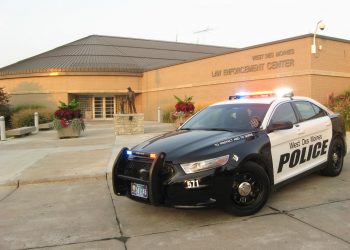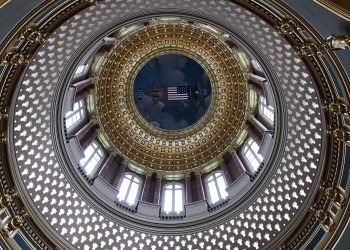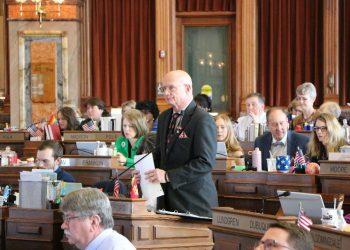DES MOINES, Iowa – The Iowa House on Tuesday night passed 91 to 3, HF 415, a bill that would require public and nonpublic accredited schools to administer the Pledge of Allegiance and display the American flag in every classroom.
The legislation also offers exemptions for nonpublic schools with religious objections, and the bill does not require students to participate in reciting the pledge.
State Rep. Carter Nordman, R-Adel, who floor managed the bill, said, “The state of Iowa is one of just a few states that does not have language in its code regarding the Pledge of Allegiance and schools. By passing this bill tonight will be one step closer to joining about every state in the Union by putting the Pledge of Allegiance in the schools.”
According to Scott Bomboy of the National Constitution Center, Iowa, Vermont and Wyoming are the only states that do not have any law regarding the Pledge of Allegiance.
The U.S. Supreme Court, in their 1943 West Virginia State Board of Education v. Barnette ruling, said it was unconstitutional for schools to punish students for not reciting the pledge.
One amendment to the bill changed the word “offer” to “administer” it passed by voice vote. State Rep. Christiana Bohannon, D-Iowa City, who supported the bill in committee, said she did not support the amendment because “offer” is “more consistent with the spirit of (the) bill, which is to make it optional.”
State Rep. Sharon Steckman, D-Mason City, complained about the time the Iowa House spent on bills like these and not on COVID-19 relief.
“There’s so much we could be doing for Iowans right now; 29 percent of our kids are in poverty, 41 percent, at least 41 percent, are food insecure. We have small businesses that are grappling to stay afloat. I think those are all things we should be working on, but instead, we seem to be set on mandating things for schools to do that seems to be our business. We seem to be micro-managing. We don’t need another mandate for schools,” she said.
Steckman also questioned the purpose of the bill.
“I don’t believe you can legislate patriotism, and I will be a no on this bill,” she said.
Bohannon spoke again.
“I’ve always loved the Pledge of Allegiance. No matter how many thousands of times I’ve recited it, it always makes me feel reverent and proud to be an American,” she said.
Bohannan said she was concerned about the lack of public comment. She shared some of her initial concerns.
“We don’t have people clamoring for it. No one spoke for it at the subcommittee. There were a total of two public comments on the website and favor. Meanwhile, people all over Iowa are begging for COVID relief 1000s more, pleading for greater support of public education. So why not focus on the things that matter most to Iowans every day? Not to mention many school districts already do offer the pledge voluntarily right here in Iowa. So why impose yet another mandate from on high. I was also concerned that kids might feel compelled to participate because of bullying or peer pressure or because they believe that an authority figure wants them to; this is especially a problem for younger children and for children who move here from other places who don’t know about the pledge,” she stated.
Bohannan warned that it would take more than reciting words in unison to foster unity.
“So I do not support this bill because I want more children to mechanically recite the Pledge of Allegiance. I support it because it’s an opportunity for kids to think critically about what those words mean and whether we are living up to them. For example, the pledge is not just to the flag but to the republic for which it stands. Our kids might ask whether our republic can last when many of our leaders refuse to denounce those who subvert our democracy. They might ask how can we be one nation indivisible if those in power pass election laws to suppress the votes of their fellow Americans. They might ask whether we have liberty and justice for all if transgender people are denied their liberties, and black Iowans are more than ten times more likely to be incarcerated than whites. I support this bill because this moment of political division is a teaching moment. I believe that education and listening to, and learning from each other our only hope for moving forward as a country,” she said.
State Rep. Mary Wolfe, D-Clinton, said her constituents are not asking for a bill like this, stating that during her almost 11 years in office, no constituent has mentioned the Pledge of Allegiance.
She shared information she received from school superintendents in her district.
“I spoke to my local school superintendents who informed me that they already say the pledge in our elementary schools or elementary classes, but have made a choice not to do it at the high school level for various reasons, including the time issue. Yes, saying it is very short. But certainly any discussion of what it means any teaching moment would take considerably longer. And we already require that our schools do way too much in the limited time they have to do it,” Wolfe stated.
She said her no vote is not in opposition to the Pledge of Allegiance but opposition to another mandate on public schools.
“If my school boards, my duly elected local school boards, voted to extend the scope of their current pledge to high school students. And that would be fine because that would be a decision made at the local level based on what works for our local teachers, students, schools,” Wolfe added.
In his closing comments, Nordman said the bill is not a mandate but an opportunity for students.
“I hope this is an opportunity for our teachers to begin teaching the real meaning of the Pledge of Allegiance. I think that’s extremely important. I think that should be a part of one through 12 grades anyways. But at the end of the day, we don’t pledge our allegiance to a government. We don’t pledge our allegiance to a person or leader. We pledge our loyalty to an idea, the American idea. We pledge our loyalty to the greatest social experiment to have ever happened on this planet. Being one of few states without the Pledge of Allegiance in our schools, we’ve been doing a disservice to our students, to our state, and to our country. I think this bill will be a good step forward and beginning to provide that,” he said.
“What makes this country so great is that we can be on complete opposite sides of the political spectrum. We can disagree; we can have those debates. But at the end of the day, we all know we’re united under one flag. And that’s why I believe the pledge of allegiance is so important. I think this is a good bill for our students—a good bill for schools. And a good bill for the state of Iowa,” Nordman concluded.
State Reps. Bruce Hunter, D-Des Moines, Steckman, and Wolfe were the only representatives present to vote against the legislation.














